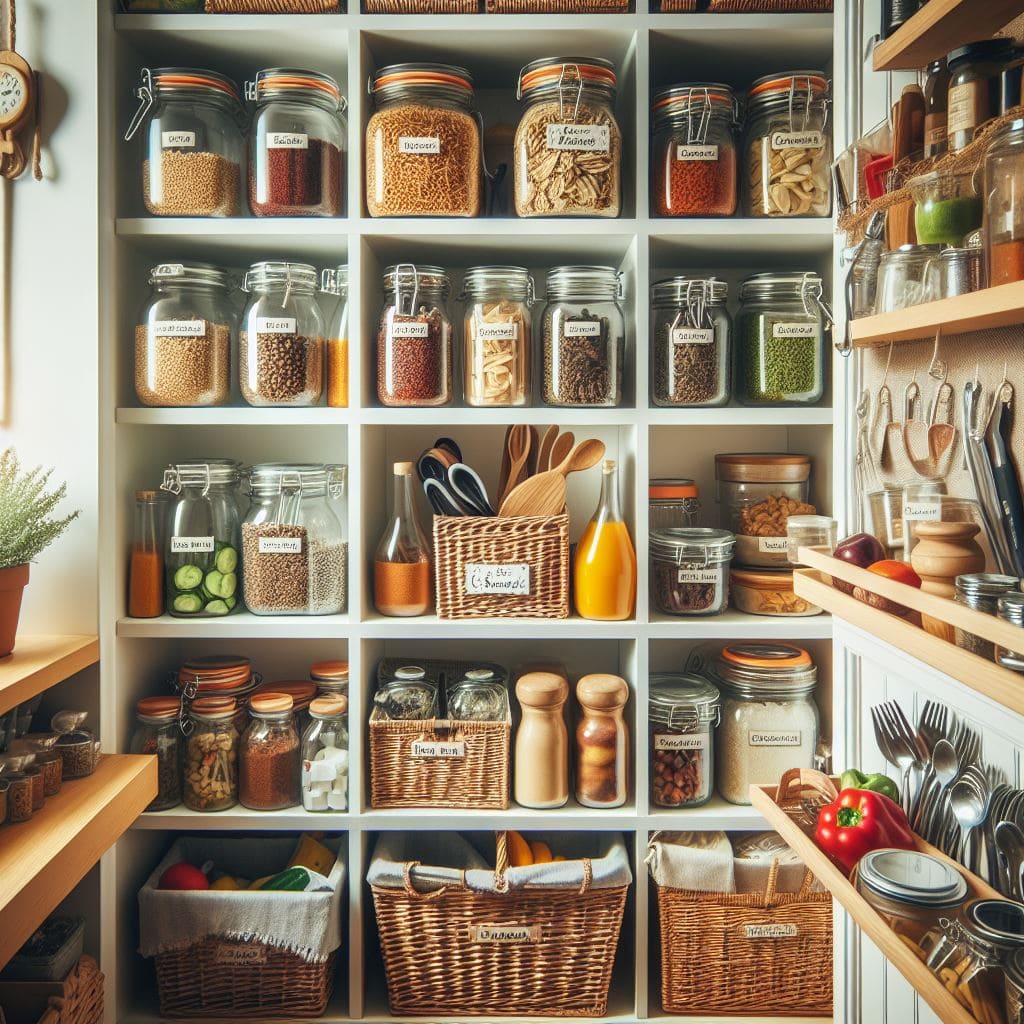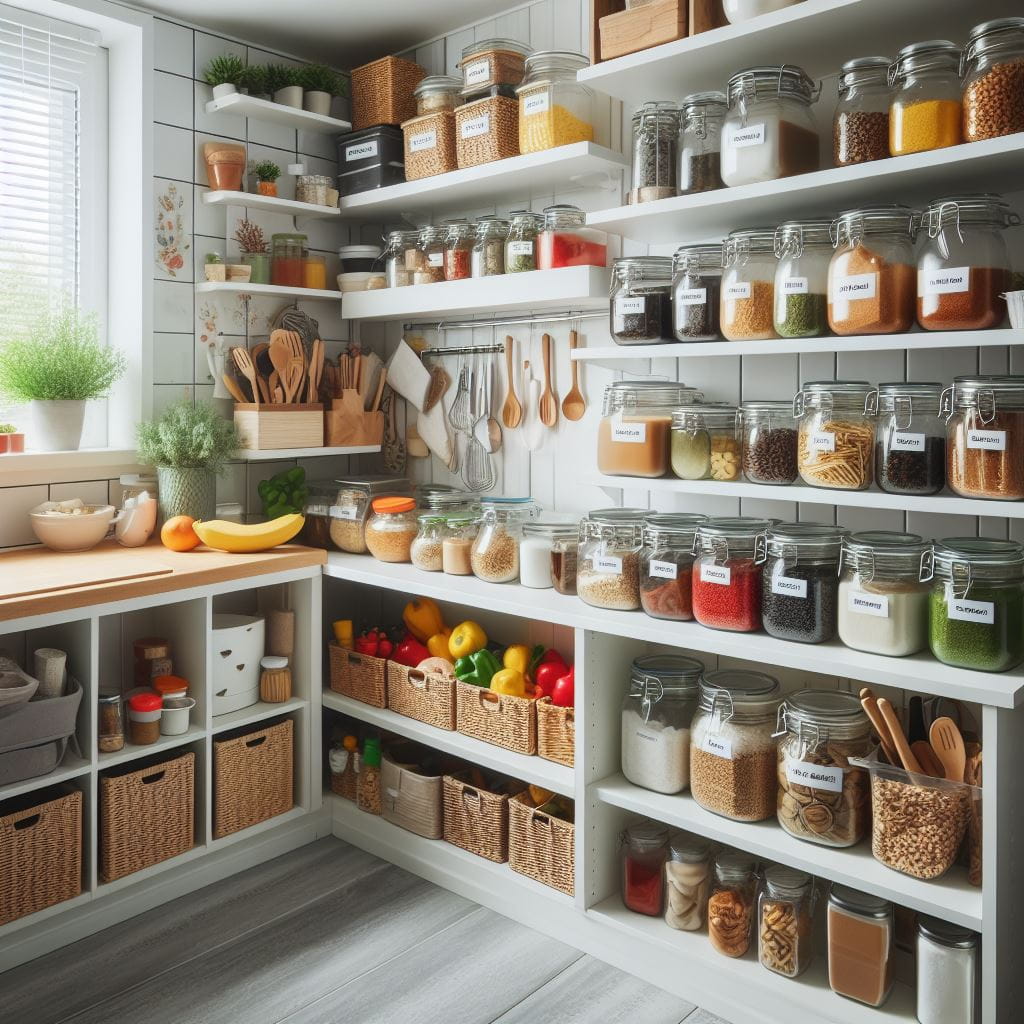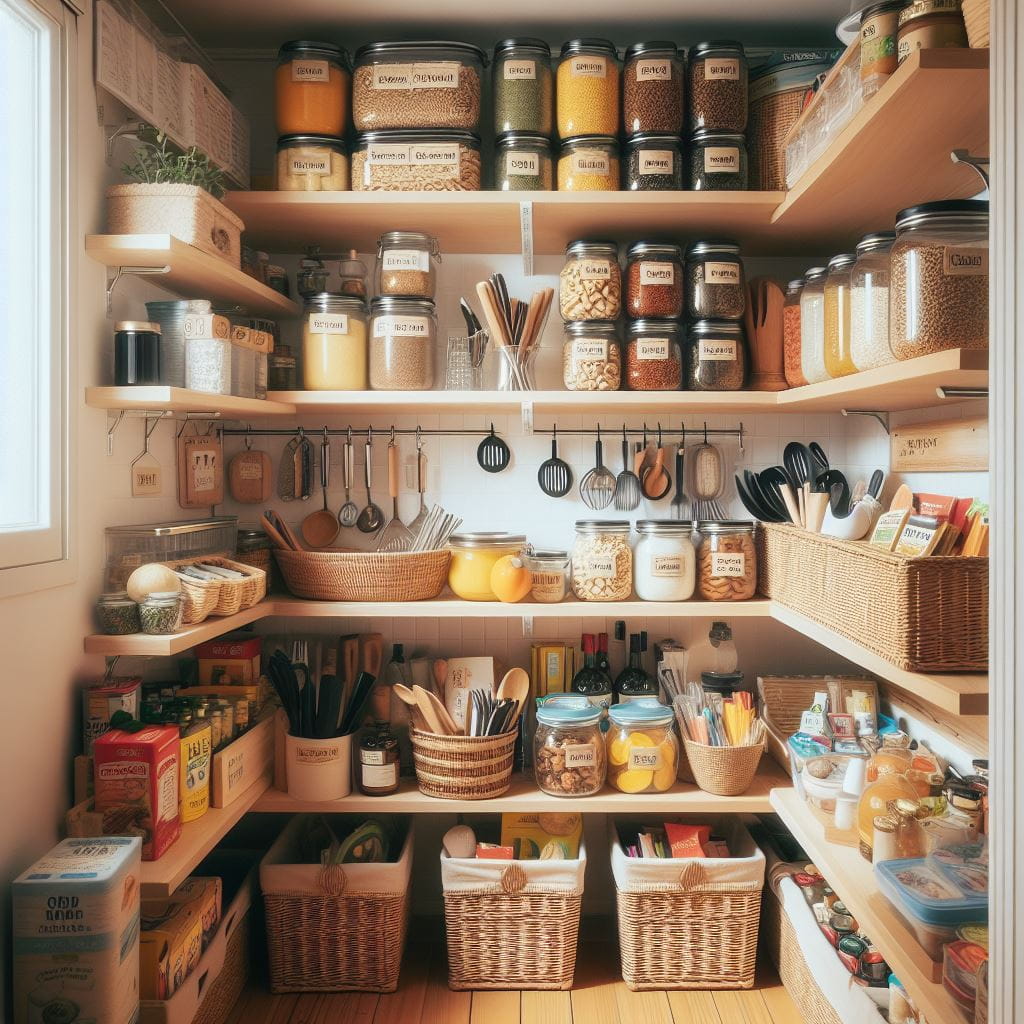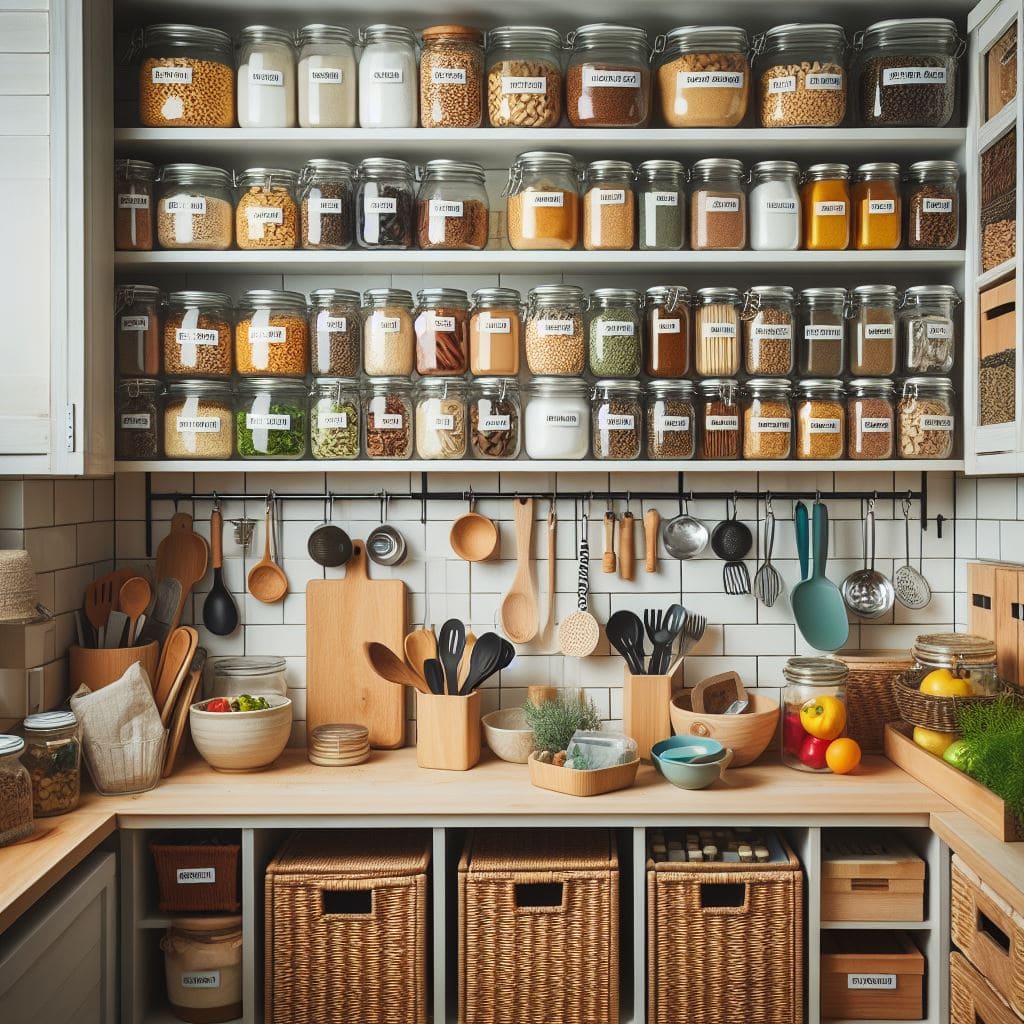Maximize your small kitchen space with smart pantry organization solutions. Declutter countertops and cabinets to enhance functionality and aesthetics.
Organizing a small kitchen pantry requires creativity and strategy. By utilizing multi-purpose storage options and arranging items efficiently, any small space can transform into a practical storage area. It’s crucial to capitalize on vertical space, use organizers like over-the-door racks, and adopt a minimalist approach to maintain an orderly kitchen.
Selecting the right containers and consistently categorizing items will simplify meal preparation and reduce the stress of navigating a cramped kitchen. Proper pantry management not only saves time but also contributes to a more enjoyable cooking experience. Implementing these tips can make even the smallest kitchens feel spacious and organized.

Introduction To Pantry Organization In Small Kitchens
Welcome to the world of pantry organization in small kitchens! For those with cozy kitchen spaces, keeping a neat and functional pantry can seem like a daunting task. But, with the right techniques, even the tiniest kitchens can transform into an oasis of organization and efficiency. Let’s dive into the best ways to maximize your space and keep your pantry in tip-top shape.
Understanding The Challenges Of Limited Space
Small kitchens come with big challenges. Every inch counts, and it’s crucial to make the most of what you’ve got. Cluttered countertops and overstuffed cabinets can make cooking a stressful experience. Recognizing the challenge is the first step to creating a more streamlined and functional kitchen environment.
- Take stock of your space
- Analyze kitchen layout
- Identify underutilized areas
The Importance Of Efficient Pantry Management
An organized pantry is the heart of a well-functioning kitchen. It’s about more than just aesthetics; it’s about making your daily life simpler and more efficient. With a system in place, you can save time, reduce food waste, and make meal prep a breeze.
- Save time searching for ingredients
- Prevent overbuying and waste
- Streamline meal preparation
Fundamental Strategies For Pantry Optimization
Organizing a small kitchen pantry requires smart strategies. Space is precious. The right techniques can transform a cluttered pantry into a functional, tidy space. Discover how to optimize every inch for a pantry that works for you.
Maximizing Space With Vertical Storage Solutions
Vertical storage unlocks the potential of small pantries. Shelves that reach the ceiling make use of often-ignored space. Wall-mounted racks or hanging organizers free up shelves. Look for stackable containers and tiered shelving. These solutions keep items visible and accessible.
Utilizing Hidden Spaces And Creative Thinking
Hidden spaces hold the key to an uncluttered pantry. Explore areas behind doors or under shelves. Employ hook systems, slim-line storage units, and over-the-door organizers. These tools creatively maximize space.
- Door racks hold spices, snacks, or small jars.
- Drawer organizers separate utensils or small packets.
- Use the tops of cabinets for rarely used items.
The Role Of Decluttering In Pantry Organization
Decluttering is essential in small spaces. Remove items you no longer use. Categorize remaining items. Implement a ‘one in, one out’ rule to avoid future clutter. Here’s a simple decluttering process:
- Empty the pantry.
- Sort items into categories.
- Discard expired goods and donate what you don’t need.
- Return items in an organized manner.
With these strategies, your pantry will be optimized for efficiency and ease of use. Implementing these practices will lead to a more streamlined, functional kitchen space.
Practical Tips And Techniques
Organizing a small kitchen pantry calls for practical tips and techniques. It’s about making the most of available space. No more clutter or lost items. Let’s dive into best practices and smart solutions. A place for everything and everything in its place, right?
Best Practices For Storing Dry Goods
Storing dry goods efficiently is key to pantry organization. The following are some best practices to maximize space:
- Use clear containers: They make it easier to see what you have.
- Label everything: No guessing games when cooking.
- Keep similar items together: Baking ingredients in one spot, spices in another.
Organizing For Easy Access And Inventory Management
Simplify your meal planning and grocery shopping. Use these tips:
- Place items you use most in easy-to-reach spots.
- Invest in a pantry inventory app or use a simple spreadsheet.
- Do a quick scan before grocery runs to know what you need.
Innovative Storage Products And Diy Solutions
Small kitchens benefit from smart storage solutions. Consider these options:
- Over-the-door racks for extra space.
- Adjustable shelf risers to use vertical space.
- DIY magnetic spice jars for cabinet doors.
Maintaining Order In Your Pantry: Daily Routines And Habits
Good habits keep pantries in check. Adopt these daily routines:
- Put items back in their designated spots.
- Spend a few minutes tidying up.
- Regularly check for expired goods.

Pantry Organization Case Studies
Transforming a crowded pantry in a small kitchen into an organized haven is a game-changer for any household. Our case studies showcase real-world pantry makeovers and offer inspiration for your own space. Witness the remarkable changes, embrace budget-friendly DIY solutions, and learn from professional organizers to maximize your kitchen’s potential.
Before And After: Real Small Kitchen Transformations
- Case #1: A cluttered shelf turned functional. We removed excess items, labeled the essentials, and introduced stackable containers.
- Case #2: An underused closet became a pantry superstar. A fresh coat of paint and carefully measured shelving doubled the storage area.
- Case #3: A catch-all drawer is now a utensil hub. Dividers and bins were used, making cooking tools easy to find.
Diy Pantry Projects On A Budget
Think outside the box with these DIY pantry hacks that keep costs down:
- Repurpose shoe organizers for snack storage. Hang them on the pantry door and fill them with grab-and-go items.
- Use tension rods to create custom shelving. Adjustable and easy to install, they make perfect dividers for baking sheets and cutting boards.
- Turn magazine holders into can organizers. Simply label them and stack them on their sides for a neat canned goods display.
Expert Insights: Tips From Professional Organizers
| Tip | Reason | Impact |
|---|---|---|
| Invest in clear containers | See contents at a glance | Reduces search time |
| Label everything | Know what you have | Avoids overbuying |
| Sort by usage | Keep daily items within reach | Streamlines meal prep |
Pro organizers emphasize starting with a clean slate. Empty your pantry, categorize items, and donate what you don’t need. Boldly label your zones to stay organized.
Continuing Your Organizational Journey
Embarking on the journey of pantry organization rewards you with a serene kitchen space. An organized pantry simplifies meal prep and keeps kitchen stress at bay. As you master your small kitchen’s pantry, the perks unfold each day. This guide only marks the beginning of a more functional culinary hub.
The Long-term Benefits Of An Organized Pantry
- Time Saved – Streamlined food retrieval
- Money Saved – Less food waste and duplicate purchases
- Stress Reduction – Easier decision-making with a clear view of items
- Healthier Eating – Better meal planning with organized ingredients
Adapting To Changes In Space And Lifestyle
Your kitchen is a living space that evolves. Stay flexible with your pantry set-up. Tweak it as needed to fit new food preferences, kitchen tools, or changes in your household size. A modular approach keeps you ready for any shift with ease.
Additional Resources For Pantry Management
Keep learning and improving with these resources:
| Resource | Description |
|---|---|
| Space-Saving Containers | Finds that maximize shelf space |
| Labeling Techniques | Methods to tag and date items |
| Apps for Inventory | Tools that track pantry stocks |

Conclusion
Transforming your tiny kitchen into an orderly haven is achievable with a little creativity. Embrace vertical storage, rotate staples, and use clear containers for an efficient, spacious feel. Implementing these strategies will make meal prep easier and your space visually pleasing.
Happy organizing!
Frequently Asked Questions For Pantry Organization Small Kitchen
How Do You Store Pantry Items In A Small Kitchen?
Utilize vertical space with stackable bins or shelves. Organize pantry items in clear, labeled containers to save space and maintain order. Maximize cabinet corners with lazy Susans. Install hooks or racks on doors for extra storage. Regularly declutter to keep only essential items.
Where Should A Pantry Be Placed In A Small Kitchen?
For optimal use of space in a small kitchen, place the pantry in a corner or alongside existing cabinetry. Utilize vertical space by installing tall, shallow shelving to keep items accessible and organized.
How Do I Maximize My Small Pantry Space?
Maximize your small pantry space by installing adjustable shelves and door racks. Utilize clear, stackable containers for easy visibility and space efficiency. Employ drawer dividers for categorized storage, and make use of wall-mounted spice racks to save shelf space. Regularly declutter to maintain organization.
How To Build A Pantry In A Small Kitchen?
Maximize vertical space by installing high shelves. Use door-mounted racks for extra storage. Opt for a pull-out pantry to conserve space. Choose stackable containers to maintain order. Utilize under-shelf baskets to increase capacity.







